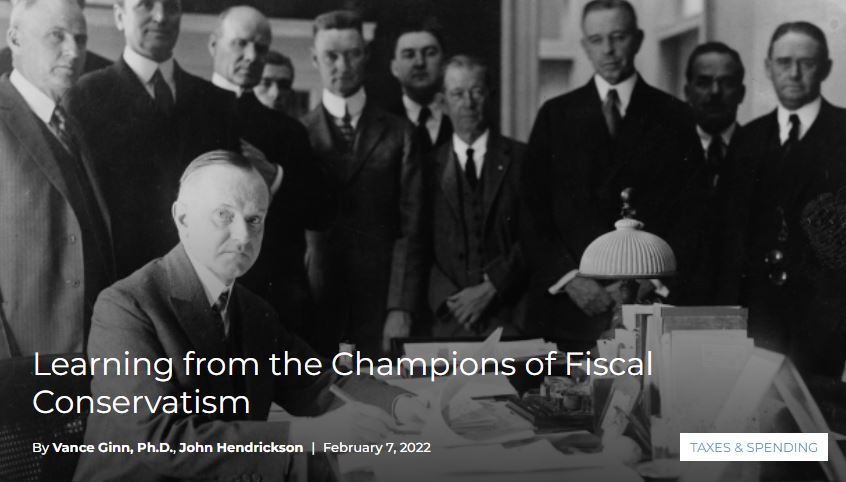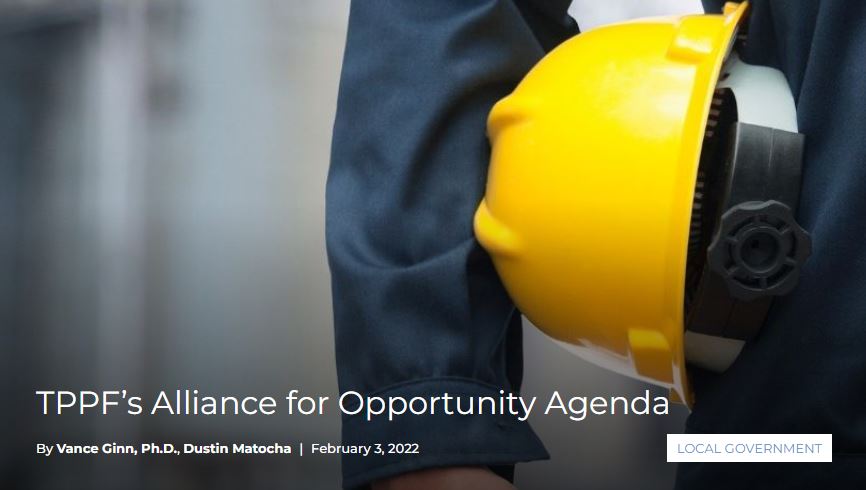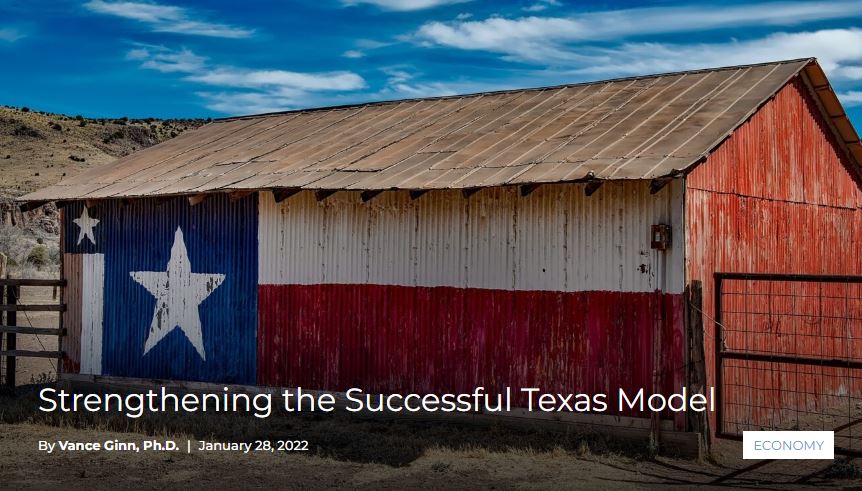|
Many Americans are recovering from the economic destruction that started in March 2020 due to shutdowns by state and local governments in response to the COVID-19 pandemic. The economy has improved, but the pace has slowed because of increased restrictions by many state governors making it more difficult to regain the tangible prosperity experienced last February. I highlight data on economic growth and employment and provide pro-growth policy recommendations to help quickly recover. More on the data ⬇️ Words mean things—and that’s just one of the flaws in Pedro L. Gonzalez’s latest piece in Newsweek, titled “The Conservative Case for a $15 Minimum Wage.”
There’s nothing conservative about the class envy Gonzalez leans so heavily upon. Nor is there anything conservative about his reliance on the left-leaning, union-friendly Economic Policy Institute to downplay the negative effects of an artificial increase in the minimum wage. Finally, it’s simply bizarre to claim that using the power of government to force specific economic outcomes is in any way “conservative.” Let’s start with the clear (and undisputed) facts. Raising the minimum wage—especially now, in the midst of a government-induced economic slowdown—would devastate small businesses. It would hurt those it is intended to help the most, by eliminating jobs, reducing the hours of those who still have them, and by cutting off the lowest rungs of the ladder to success. (When I say “undisputed,” I mean it—the real question for most economists is whether the tradeoffs are worth it.) We’ve already seen the devastation that government action can cause during the pandemic, as the broad U6 unemployment rate remains at an elevated 11.1% and almost 800,000 people are filing initial jobless claims every week. Yet Gonzalez brushes these economic realities aside and begins with exactly the kind of argument you might expect from U.S. Sen. Bernie Sanders—a Democratic Socialist, and the furthest thing from a conservative you’ll find in the Senate. It’s class envy—the “CEOs make more than you” argument. “This is,” he writes, “… the consequence of policies that intentionally greased the wheels of greed.” It’s workers versus the bosses in Gonzalez’s mind. “Lawmakers and lobbyists have deliberately guided the ‘Invisible Hand’ to pad the pockets of the very few at the expense of the many,” he writes. “The former receive acclaim as captains of industry while the latter subsidize their bailouts and are told to bootstrap themselves.” He’s not completely wrong there; but that’s not an argument against free markets. Rather, it’s a damning indictment of the kind of government intervention Gonzalez is calling for. The bailouts are the problem, not the bootstraps. And that brings us to the second point. For EPI—and by extension, for Gonzalez—the rigged economy shouldn’t be fixed, just re-rigged, with the labor movement as the primary beneficiary. According to its website, EPI believes “A strong, effective labor movement is essential for democracy and to ensure an equitable sharing of income and wealth,” and “Economic policy should focus on improving conditions for working people.” Yet the tired labor vs. management dichotomy misses what is truly the heart and soul of the U.S. economy—small businesses. Tens of millions of Americans are both, workers and managers. They don’t merely own the means of production, they are the means of production. Yet millions of those small businesses--nearly a third, in fact—have either closed because of the government-ordered shutdowns or fear they will soon be forced to. A minimum wage increase, advocated by Gonzalez and EPI, would shutter many, many more of them. This is quite literally government picking winners and losers—something incompatible with conservatism. So is the one-size-fits-all, top-down approach. And that’s my third point: This is in no way a conservative policy position. The fact is that one size never fits all. That’s especially true with the minimum wage. We know that 58.5% of Americans earning the minimum wage are between 16 to 24 years old. And we know that costs of living vary greatly across states, with California being 50% more expensive than Texas. There simply is no “conservative case” for a minimum wage increase. Yet a closer look at American Greatness, the website where Pedro Gonzalez serves as assistant editor, seems to indicate that it’s less interested in conservative ideas than in redefining the word. Look, we know what works. The Trump economy focused on freeing Americans to pursue their own dreams. In February 2020—before the pandemic and the government shutdowns—the U.S. unemployment rate was 3.5% (well below what most economists consider full employment). The rate for the nation in January 2021 was 6.3% after many have dropped out of the labor force. What we need is a clear path to economic recovery—a recovery based on letting people prosper. And that’s what we at TPPF have outlined in our Responsible Recovery Agenda that’s meant for Texas but is applicable to other states and even D.C. It’s conservative—in the real meaning of the word. https://www.texaspolicy.com/theres-no-conservative-case-for-hiking-the-minimum-wage/ Texans are ready to return to work.
Due to the COVID-19 pandemic and forced business shutdowns by state and local government mandates, Texas’s unemployment rate in December sits at a staggering 7.2%, compared to 3.5% the previous year. Not only is unemployment high, but many businesses have failed or are on the verge of failing. What can we do about it? TPPF’s Responsible Recovery Agenda would help speed up the recovery so Texans can regain their prosperity through a pro-growth approach of spending less, taxing less, and regulating less. Having state government do less now—while understanding in some areas that will be difficult—is the solution to doing more for Texans tomorrow. Spend less. Gov. Abbott noted in his recent State of the State speech that “we must balance the state budget without increasing taxes.” So far, this has been the case for the current 2020-21 budget and for the House and Senate versions of the 2022-23 base budget of about $251 billion. This amount is under TPPF’s Conservative Texas Budget of $246.8 billion because $6 billion is for maintaining property tax relief from last session instead of growing government. Continuing to reduce spending and accepting budgets below this representation of the average taxpayer’s ability to pay (meaning population growth plus inflation) will allow Texas to start making strides toward economic recovery. This should include strengthening the state’s weak spending limit for the long run as would be the case with HB 594 (Krause) and HB 910 (Parker). Tax less. Although taxes are necessary to fund government programs, they distort and limit economic activity in the private sector. During a time when many Texans are struggling to make ends meet, tax increases must be off the table. In fact, there should be a continued push for tax relief. While SB 2 last session provided historic reforms to the property tax system, there are already those interested in rolling back those reforms which must be maintained and even improved upon. One way is to clarify the “disaster loophole” that some local governments are using to substantially raise property taxes. By appropriately limiting spending, more tax relief is possible while continuing the action last session of moving Texas’s tax system more toward an efficient, fair, and pro-growth sales tax system. Movement is afoot in the Legislature to limit state spending so surplus dollars can replace school districts’ maintenance and operations property taxes, which comprise nearly half of total property taxes paid statewide. This could be done through different approaches like HB 958 (Oliverson), HB 59 (Murr), or others on the way. Another tax to consider cutting is the business franchise tax, often called the margins tax. This tax limits a firm’s ability to hire workers and grow their business from its costly gross receipts-style tax and unnecessary complexity of tax compliance. Regulate Less. Texas continues to excessively regulate entrepreneurial activity, many of which are unnecessary and harmful to the state’s economic freedom. The state has looked to cut regulations before the COVID-19 pandemic, but much more can be done given what we’ve learned since. Some occupational licenses and other regulations were suspended during the efforts to relieve the economic burden holding back resources and services during the pandemic. Gov. Abbott recently said, “That is why I am asking the Legislature make permanent some of the regulatory relief that I authorized. This will cut red tape and unleash the full might of the Texas economy.” We agree. Having unnecessary barriers to earn a living especially hurts those who do not have the time or money to get “certified.” While some regulations make sense, the Texas Legislature should take a look at each of the more than 263,000 restrictive regulations to ensure that each protects Texans and serves its intended purpose. If that’s not the case, then the regulation should be suspended, or better yet, eliminated. An innovative idea is HB 819 (White) which would create economic zones to waive some regulations and occupational licenses in low-income areas so that people have more chances to flourish. Other bills have been filed to help remove excess barriers limiting opportunity. Texans’ improved livelihoods through a robust recovery by opening fully and removing governmental obstacles should be a top priority. The Responsible Recovery Agenda is a roadmap that emphasizes how to do this through spending less, taxing less, and regulating less. https://www.texaspolicy.com/responsible-recovery-agenda-texass-roadmap-to-recovery/ It feels like there’s hope on the horizon. As Gov. Abbott said in his recent State of the State speech, “With each passing day of more vaccinations and increased immunity, normalcy is returning to Texas.” The Texas economy is recovering and at long last, some normal activity is returning. We’re not out of the woods yet, but we can at least see a clearing ahead.
Yet too many Texans could be left behind. “The situation in the Houston area is particularly desperate, with almost half of residents struggling to pay basic expenses in the week ending Dec. 7, according to a Census Bureau survey,” Pew reports. Lawmakers can help, but the help must be the right kind. History shows that our poorly designed welfare system traps too many people in poverty or near-poverty. Economists like me will tell you that people respond to incentives, and the welfare system disincentivizes self-sufficiency. So, the best response is to unleash opportunities for people to prosper. We can reverse those incentives and show our fellow Texans that they can achieve their American dream. How? Through what we’re calling the Opportunity Project that provides a path to dignity, self-sufficiency, and prosperity. Let’s start with more effective training for better jobs. We can tailor our state’s workforce development efforts more narrowly to the jobs that are out there and the skills that are needed. Texas is a prosperous state with many job opportunities, but a portion of the populace lacks the skills necessary to get and keep these jobs. But we know what helps. Welfare-to-work programs, with the vital participation of the private sector, can change lives. Generally speaking, such programs target disadvantaged populations, provide training in a marketable skill in addition to “soft-skills” instruction, and offer wraparound services (such as child care, transportation vouchers, housing assistance, etc.), job placement services, and follow-up services to help graduates stay on a path to success. One example is the earn-while-you-learn program established by the Texas Federation for Advanced Manufacturing Education (FAME) in San Antonio. The employers in the consortium offer a competitive wage that gives program participants the safety net they need to leave low-paying jobs or welfare. The payoff for employers is a steady stream of well-qualified workers. Next, let’s lower barriers to entrepreneurship by rolling back restrictive regulations like occupational licensing. Nationally, nearly 22 percent of jobs require an occupational license. That makes sense for doctors, but many other occupations are questionable at best—such as cosmetologists having to complete 10 times more days of training than EMTs. And it’s not just the silly licensing rules; many licensing schemes exclude those who have a criminal conviction. We believe in second chances; that should also apply to occupational licensing, especially when the license has no direct relationship with the long-ago crime. Finally, where we can, we must keep the existing welfare system from unintentionally trapping people in a life of helplessness. Welfare should be reprioritized to count as “successes” those who move off and stay off it rather than those enrolled. We can streamline and simplify the sign-up process and implement efficiency audits of programs to ensure those Texans who need help receive it, while clearly defining the pathways out of welfare dependency. Where the system creates a welfare benefits “cliff”—in which families lose benefits arbitrarily or too quickly when they re-enter the workforce—we should demand a smoothed approach that doesn’t disincentivize work. Of course, a strong and vibrant economy is key to making this work. Gov. Abbott made this point: “Texas has been ranked the number one state for business for 16 straight years. For the past eight years, we led the nation in economic development, and we have led America in exports for 18 straight years. The Texas model. It inspires entrepreneurs and innovators and attracts job creators from across the entire country.” Strengthening the Texas Model is the best way to uphold this, with lower taxes (and no personal income tax), fewer unnecessary regulations, and a commitment to limited government. This framework provides more economic freedom and greater opportunity for all Texans. The COVID-19 pandemic isn’t over, but recovery is on the way. Let’s work to assure every Texan can participate when the economy opens and thereafter. https://www.texaspolicy.com/opportunity-project-leaving-no-texan-behind/ |
Vance Ginn, Ph.D.
|




 RSS Feed
RSS Feed